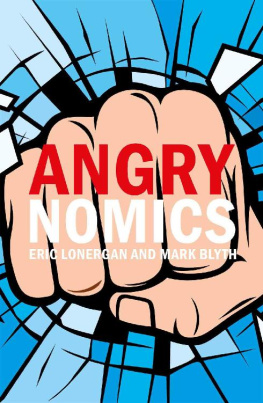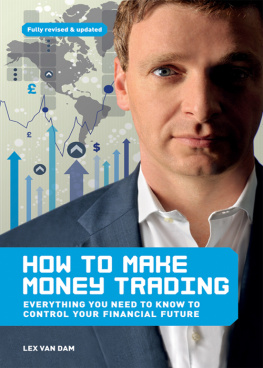MONEY
Money
Eric Lonergan
ROUTLEDGE
Eric Lonergan, 2009, 2014 Second edition 2014
This book is copyright under the Berne Convention. No reproduction without permission. All rights reserved.
First published in 2009 by Acumen
Acumen Publishing Limited 4 Saddler Street DurhamDH1 3NP www.acumenpublishing.co.uk
ISBN: 978-1-84465-823-7
British Library Cataloguing-in-Publication Data
A catalogue record for this book is available from the British Library.
Typeset in Warnock Pro. Printed in the UK by 4edge Ltd., Essex.
Contents
Interdependence I
Time and money
Measurement
Moneys allure
Interdependence II
Acknowledgements
I should like to thank Steven Gerrard at Acumen for proposing the idea of a second edition of Money . His timing was perfect. I have received invaluable feedback from Mark Blyth, Philip Coggan, Joanne Ely, Tristan Hanson, Joseph Little, Rupert Taylor, Mark Vernon and Sean Wade. I benefit continually from conversations about many of these issues with Daniel Mytnik, Alex Pierce, Paddy Boyle, James Hanham and all my colleagues at M&G, particularly Dave Fishwick. I should also like to thank Martin Wolf at the Financial Times for continuing to support publication of some of the more controversial views published here, and also for ongoing and lively debate. I am very lucky to have the support of another writer, my wife, Jo. She provides invaluable insights on many of the ideas and on how to convey them. Thanks also to Kate Williams for excellent copy-editing and comments. To Corinna, Maia and Gina: grazie di cuore .
Introduction to the second edition
A second edition is an opportunity to fix flaws in the original, respond to the work of others and address new developments. On re-reading Money after four years, I was reluctant to change the structure or brevity of its core arguments. But there is a wealth of new work that merits discussion, and a major economic crisis occurred in Europe that this book can help explain.
To address these competing demands, the Further Reading section now includes a detailed discussion of relevant books published more recently.
The Eurozone crisis warrants its own chapter; this has been included as a Postscript. As a market participant who experienced this crisis at first hand, I have come to conclusions on its causes that are very different from the official view. This perspective is consistent with the central arguments in Money . In the Postscript, I argue that the crisis was avoidable. It was caused, and brought to a close, by the actions of the European Central Bank.
Money is not a cigarette
Two more general omissions exist in the first edition: a deeper discussion of fairness and inequality, which is the subject of a new chapter (Chapter 9); and a discussion of the meaning of money, which makes up the remainder of this Introduction.
Reading the histories of money and finance written in recent years, and observing the confusion in much of the debate about quantitative easing and fiscal policy, left me with a regret. Although my brief was to write a philosophy book, I did not make the definition of money a subject of direct analysis. I focused on the properties and consequences of money, assuming that its definition an asset whose primary function is payment was uninteresting. This was an error. Confusion over the definition of money is central to the major macroeconomic policy failings in the developed world since the financial crisis in 2008.
With a clear understanding of money, for example, it makes no sense to engage simultaneously in both quantitative easing (explained below) and austerity, as much of the developed world has done. Quantitative easing (QE), by definition, means that governments can borrow and spend freely.
The word money is often used casually to describe different things. In common conversation money is often interchangeable with wealth. We describe someone as having a lot of money, meaning they are wealthy. We also refer to deposits held in a bank as money (or cash) in the bank, even though deposits are really loans we make to banks, which they may or may not honour.
Despite this, money also defines something unique: physical cash and its electronic equivalent, bank reserves. The technical term for these is monetary base, which is a measurable quantity and is consistent with our intuitive sense of the meaning of money: a valuable asset with which we pay for things.
A specific confusion seems to pervade formal analysis of money: this is the claim that money is a debt, or a liability, of government. I shall argue that this view is an analytical error, but in part it explains why governments have pursued inconsistent policies, such as simultaneously creating money through QE and trying to reduce government borrowing.
To non-economists, the suggestion that money is a debt makes little sense. Try asking someone in America what they think they are owed for their ten-dollar bill. Or in the UK, ask a taxi driver if they are worried about the government defaulting on a twenty-pound note. You will get some very strange looks. The question is incomprehensible. If you have money, nobody owes you anything. Money is an asset you can buy things with. A ten-dollar bill is not a debt; it has value, purchasing power. This intuition is correct. So what is the origin of the experts confusion?
The belief that money is a debt has multiple causes. One of the disconcerting features of money, discussed in Chapter 1, is that it is created out of nothing. It causes us cognitive discomfort that something effortlessly created and of no intrinsic value (or even physical form) can be so important and valuable. Calling it a debt seems to be more reassuringly concrete.
The second reason why money is often confused with debt is a coincidence of history. Historically, debt certificates were often used as money. In many countries the first money was letters of credit and bills of exchange of private banks. A piece of paper issued by a creditworthy private bank was a very convenient form of paper money in fourteenth- and fifteenth-century Florence. A perfect description of this practice can be read in the magnificent Money and Beauty (Sebregondi & Parks 2011). But just because a debt can be used as money does not mean that money is a debt. This is a logical fallacy. Think of a clearer example: cigarettes are often used as money in prisons. This does not make money a cigarette.
A sophisticated version of this error is evident in Felix Martins Money (2013). In this entertaining history of money, Martin highlights the fact that even primitive economies have complex systems for credit, clearing and settlement. Credit is needed to solve an intertemporal problem (see Chapter 4). In the simplest terms, some people have more money than they need now and others need more now than in the future. Borrowing and lending is the solution. Clearing and settlement arise because often it is easier to exchange goods and services immediately. Verified payment takes place subsequently. Martin is right to identify the importance of this process, but he tries to argue that it is money. This is a similar logical error. Money is a specific thing, it has a specific quantity, and it can be clearly defined in a way that is distinct from debt, credit, clearing and settlement.
Accounting convention has also contributed to economists confusion. Money is an asset. Its specific value as an asset what makes it money is in our ability to pay for things with it. However, in standard accounting, known as double-entry bookkeeping, every asset has a corresponding liability. When you deposit money with a bank, and the bank uses the cash to make a loan, it has a liability (the deposit) and an asset (the loan). Accountants dont seem to like the fact that governments can create money an asset out of thin air, without a corresponding liability. So they designate physical notes and coins and bank reserves (the electronic version) a liability of government. Strictly speaking, notes and coins and bank reserves are called the monetary base, which is described in conventional accounting as a liability of the central bank, and the balance sheet of the central bank is consolidated with that of the rest of government, so money becomes a liability of the state.






